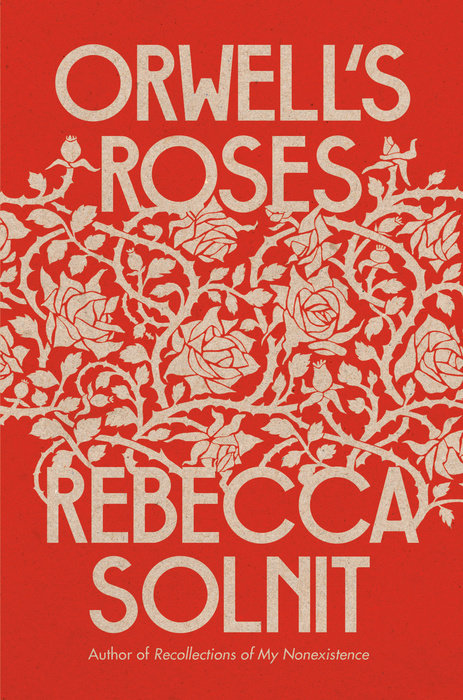
Rebecca Solnit is a writer who is always interesting, whether she's writing about walking, feminism or other social issues, though I will admit to not always liking her writing style. (I've read a few of her books but inexplicably, seem not to have reviewed them on this blog!).
A friend recently lent me Solnit's latest book Orwell's Roses, which uses George Orwell's love of roses and gardening as a way into covering not only aspects of his biography but also issues as varied as rose cultivation and totalitarianism.
Orwell is well known as the author of 1984 and Animal Farm and his love of nature is often unacknowledged, though as Solnit points out, becomes apparent with a close reading of works such as 1984. Even his very name reflected his love of nature, when Eric Blair decided on his pen name, he chose Orwell, the name of a river in Suffolk, close to his parents' home.
Solnit's journey starts as she visits the garden of the cottage in rural Hertfordshire where Orwell lived for some years. From here, she examines Orwell's own love of nature and the symbolism of roses and flowers in general, taking apart the view held by some social activists that flowers are trivial. Orwell himself argued for people to be able to enjoy life alongside the need to overturn repressive political structures. Solnit discusses the degree to which our relationship with nature is political, and becoming increasingly so in this era of nature depletion and climate chaos. She also argues for the need for art that is not directly political, but that which offers a much-needed sustenance and solace for activists and indeed all of us in our everyday lives.
From here, Solnit also looks at injustices in the flower trade. She travelled in Colombia, where a flower industry (mostly supplying consumers in the USA) was first started as a replacement for the coca trade. And it is an industry, with millions of roses being produced every year, with detrimental effects on both the local environment, including depleting the groundwater, and the workers' health and rights. The flower industries in Kenya and Ethiopia (producing flowers for European consumers) are similarly detrimental. Of course these are not the only "things that look beautiful and are produced through hideous means" as Solnit says: "I have often thought of this disconnection as a lack of integrity that's pervasive in modern life".
She also touches on topics such as mining coal (which is of course the long dead remains of prehistoric plants) and takes long digressions, including a chapter on the writer Jamaica Kincaid who wrote about flowers from the point of view of an expert gardener and who considers the impact of colonialism on botanical science. I enjoyed these digressions, finding them interesting explorations of related topics, but, judging from some of the reviews of this book on Goodreads, some people just find these digressions annoying.
Orwell's Roses by Rebecca Solnit, published (2021) by Penguin Random House.
2 comments:
I'm reading this book just now and I'm with you - there is something about her writing style that just doesn't work for me. I feel like I really should like her books (I like a lot of what she says online) but it just doesn't happen and I have to push myself to keep reading (this isn't the first time - I didn't finish 'A Field Guide to Getting Lost'). Still, other people seem to love them so she's doing OK.
Hi Rachel, yes I'm exactly the same, i feel I should enjoy her writing more than I do. This book is full of interesting facts and ideas, but I did often feel bogged down by the writing style.
Post a Comment